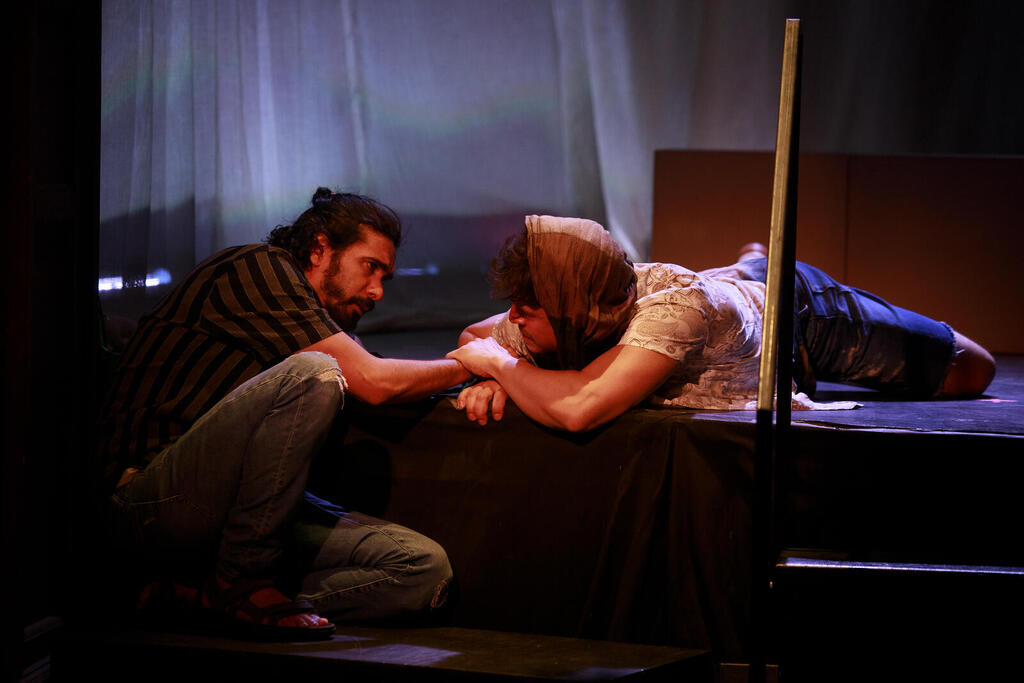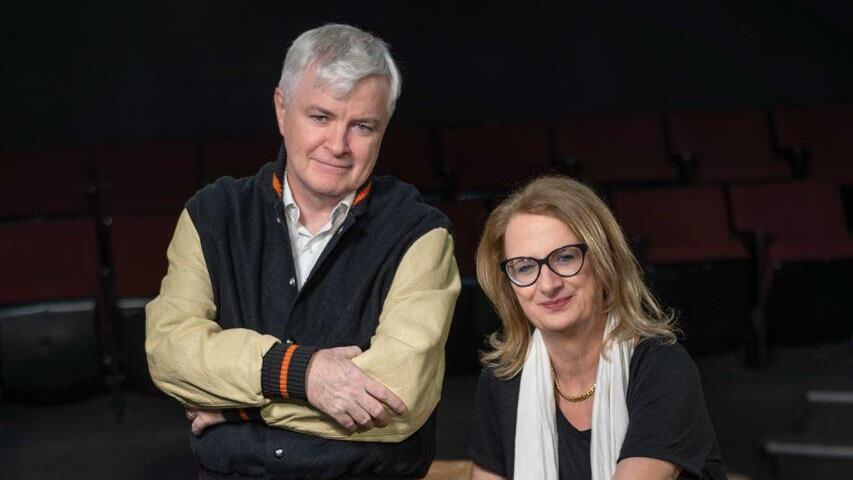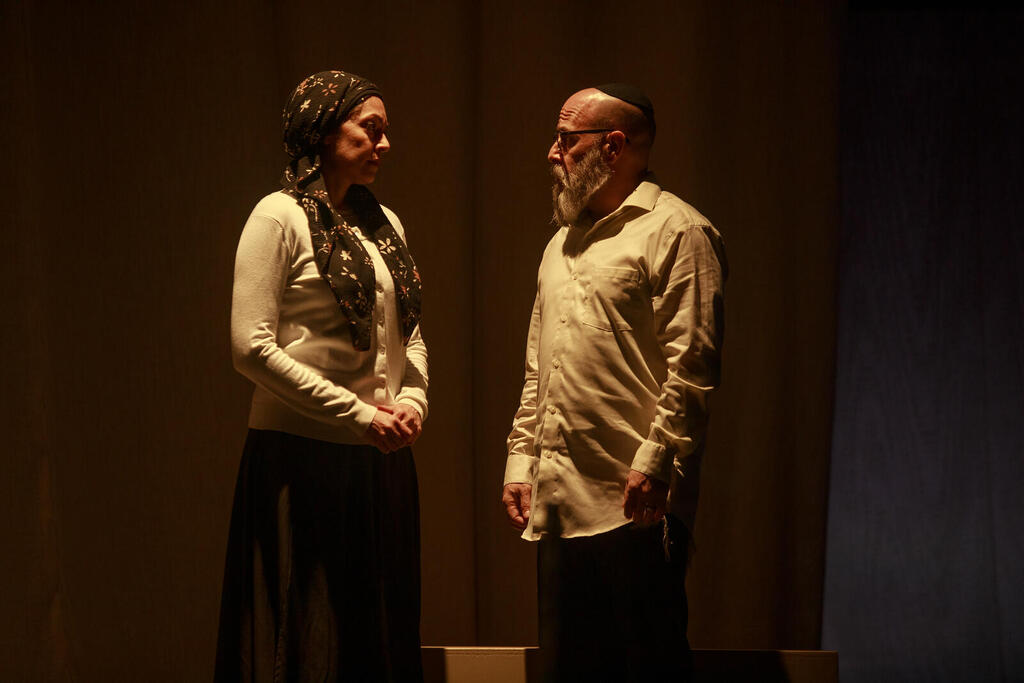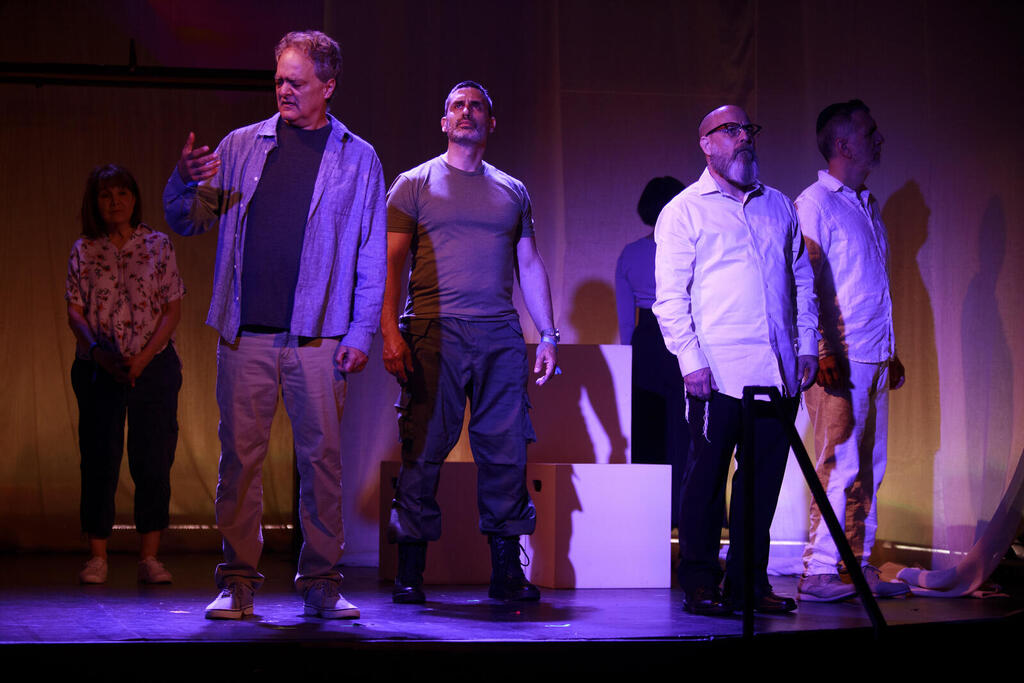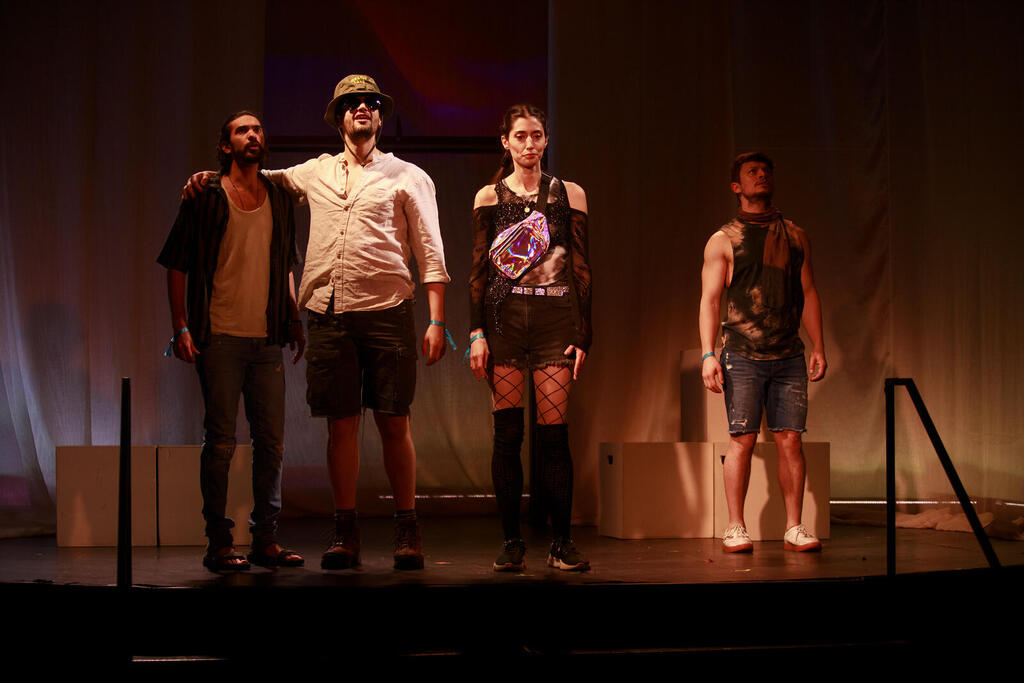'October 7' trailer
(Video: The Ann and Phelim Scoop)
One of the first plays about October 7 premiered in New York as an unexpected initiative by a couple of Irish, Catholic and conservative journalists who felt there was a story in the horrible attack that no one wanted to address. Even finding a Broadway theater willing to stage their play was a challenge. "It's amazing, isn't it? In 2024, you can't find a theater in New York to put on a show about a massacre against Jews," Phelim McAleer, 57, told Ynet.
He co-wrote the play with his wife, 60-year-old Ann McElhinney. "It's also very, very sad, or even amusing to say that in 2024 the only show in New York that needs constant police protection is a show about Israel. No other play in New York needs police presence. A play about Israel, a play about the Jewish people, needs protection in New York. In 2024. How did we get here? We're Catholics, what do we know? But I certainly didn't think the world was so filled with antisemites, especially not in the U.S."
The location that was ultimately chosen, the Actors Temple Theatre, is a half-synagogue half-Off-Broadway theater. "October 7" is entirely based on testimonies collected by McAleer and McElhinney during a visit to Israel in November 2023, their first visit to the country. "I don't think I ever met a Jew in person until I came to America, and somehow I have only Jewish friends here today," McElhinney says.
"I spoke to a very good friend of mine from Connecticut, and she connected us with her cousin who lives just outside Tel Aviv and helped us to reach people. She knew people from Ofakim, introduced us to the rabbi there, and it continued from there. Ultimately, we're journalists, so we just started making phone calls, and it was truly a unique privilege to speak to the people we met. Remarkable people, each of them– very, very strong in their own way," she added.
A play about Israel, a play about the Jewish people, needs protection in New York. In 2024. How did we get here?
“Given the recent history of Irish behavior toward Israel, you know ... It was a challenge we had to face. I apologized for being Irish for the first time in my life. I remember being in a barbershop in Tel Aviv, I heard people talking about the prime minister of Ireland and his statement about Emily Hand, an Irish Israeli girl who was cruelly kidnapped, and he presented it as if she went missing.
“So I told the people around me that I'm Irish and I apologize on his behalf. I said that not everyone in Ireland is like him, and we all got close, hugged each other. So it was a very specific experience to be Irish and work on this story at this time, I have to admit," McElhinney says.
"Even when we checked in at El Al, the flight attendant told us, 'I was supposed to fly to Dublin to get my master’s degree. There's no way I'm going there now.' Usually when you travel abroad and say you're Irish, everyone's eyes light up and they say, 'Oh, lovely! We love the Irish.' But not in Israel."
What's the meaning of this rift between Ireland and Israel? Where does it come from?
"There are several reasons for this," McAleer explains. "First of all, Ireland also dealt with the oppressed narrative about the UK for so long, so they simply internalized it into the story of Israel and Palestine without much understanding of the facts on the ground."
“I also think it has to do with feelings of guilt. Many people from the Republic of Ireland didn’t support the people in the north during The Troubles (the Irish conflict that occurred from the late 1960s to the mid-1990s between the ethno-religious groups in the population of Northern Ireland). They didn't like the violence, didn't like that it reached their doorstep. They felt a bit guilty for not supporting their Catholic brethren in the north, and now I think this is their way of erasing that guilt," he says.
“It's easy, after all, to support people thousands of kilometers away from you when you don't have to live with the consequences. And besides, there's always a good dose of antisemitism at the base of all this. Ireland is also a fairly leftist country, and the left generally is very pro-Palestinian. So those are the four different components of Ireland's lack of support for Israel: colonialism, guilt over lack of support for the IRS, antisemitism, and a very active leftist faction."
And how did you evade this narrative?
"I grew up in Northern Ireland. I was the editor of the Irish News during The Troubles and then later at the Financial Times. I remember those people who today are Hamas’ biggest supporters. I remember how they looked at us from above as if we were something stuck in their shoes. I remember it well," McAleer says.
“And on the other hand, we saw a very interesting story and thought we wanted to tell it. Hiding things just isn’t something that suits us. It's an honor to tell such a story, and we will continue to tell it even in places where people don't want to hear it. We noticed that people want to talk about Gaza and October 8, but it seems that no one wants to talk about October 7, neither in the media nor in the global elite," he adds.
McElhinney: "We were quite shocked by how efficiently the media caused people to look at something else so quickly and not talk about this massacre. Normal people accepted it, started talking only about fuel and electricity in Gaza, about cease-fires. It forced us to travel to Israel and talk to people. We thought, 'We need to tell this story and we need to find a creative way to do it.'"
'The antidote to hate is empathy'
"We want people to remember - as they say in Hollywood - the 'origin story' of the war in Gaza," McAleer says. "It's very important, and it's also very sad that New York, the center of the theater world, is one of those places where people don't want to hear it, and actively oppose it with protests and demonstrations on campuses."
The couple says the plan for the day after the ongoing round of performances is to bring the play to Broadway's large venues, and then take the show on the road to all Ivy League university campuses – especially Columbia University.
"We think they need to hear it the most," McElhinney says. McAleer adds: "They need education they don’t get in their classrooms. The antidote to hate is empathy – and radicals on campus need a big dose of it, so we'll reach them too. We're a nonprofit organization. We receive donations from the public, so we have supporters who have supported us for years. We truly believe in our mission – to tell stories that won't be reported in the media."
One of the major challenges of the play is its 'Show, Don't Tell' aspect. On the premiere we attended, a diverse cast of actors, including Jewish and Muslim Israelis, successfully brought the written testimonies to life and enriched them with high skill. However, as in many cases in the Verbum theater genre, there’s a risk that at some point the viewer will get lost in the words and feel sucked into an endless loop repeating itself on stage.
"Look, Verbum is both a challenge and an opportunity," McAleer says. "You're limited, but if in a regular play the audience sits back and absorbs what the playwright wrote for them, in Verbum, they lean forward to listen to every word because they know every quote is true and spoken by a real person. It adds something to the play when you know every word you hear is reality, you experience 13 different variations of the story, and you don't know where it's going."
What about claims saying it's too early?
McElhinney: "People in Israel think everyone is obsessive about this story, but unfortunately outside of Israel, they're not. Although they should be. This is one of the most important stories of the decade, but there is a huge, concentrated effort in the world to try to forget October 7 and push it into the void of memory. If they want their story to be known, they need plays like this. They need this story to be told in every creative way possible, and if not now - it will be too late."
As part of this, Israel's Cultural Affairs Consul to the U.S., Yael Hashavit, told Ynet: "This production is the first milestone among a number of productions on the events of October 7 that we’re about to see on New York and U.S. stages soon."
'October 7 is Israel's darkest story'
During the show, directed by Jeffrey Kantor, audiences hear testimonies of the wounded, the victims and also those who saved dozens of people and fought back. Among the testimonies are grandmothers and mothers who hid for hours in safe rooms while wondering if their families survived; an armed policeman with only nine bullets left in his gun, who killed terrorists and saved dozens of his neighbors; an IDF soldier who defended his kibbutz and was shot five times by three different terrorists; a Coca-Cola truck driver who saved over 100 people in his truck; and testimonies of youths who narrowly escaped the massacre at the Nova Music Festival while under the influence of drugs who saw the slaughter around them.
For example, Yitzhak thought that the terrorists’ glider were Israelis and waved to them – until they started shooting at him; or Shani, who hid all night under thorny bushes while people around her were slaughtered. At dawn, she begins to pray despite not being religious. A bird landed on a nearby branch, and suddenly she says: "I have a feeling that my late grandfather was with me. When I finally got home late that night, I told my mother about it, and she told me the date my grandfather died. October 7, 2016."
These true testimonies emerged from interviews the couple held in Israel. The playwright duo explains that "October 7 is Israel's darkest story, but it's also a story of survival, hope resilience, and fighting back against the dark."
The creators received many refusals from theaters that didn't want to take on the heavy burden of additional security details, but ultimately the chosen location was far from being a compromise.
The Actors Temple Theatre is a theater and synagogue founded in 1917 as the West Side Hebrew Welfare Union. Its location, in the heart of the Manhattan theater district, has led to a special connection with the Jews in the show business industry surrounding it.
It has attracted talents from across documentary theater, musicals and dramatic theater as well as nightclub personalities and television stars. Among its members over the years were past legends like the Marx Brothers, Al Jolson (considered the first Jewish entertainment star in the U.S.), entertainer Sophie Tucker, Red Buttons, Edward G. Robinson, Jack Benny and Shelley Winters. Non-Jewish stars like Frank Sinatra and Ed Sullivan also frequented the establishment.
For McAleer and McElhinney, this is another joint project on their list of accomplishments after writing books that appeared on the New York Times bestseller list and creating popular films and podcast series, such as the one investigating actor Kevin Spacey's exoneration.
"Working together is mostly good," McElhinney says. "Of course, it's very challenging, and it's very stressful to work as a couple. But it's been working for over 20 years, so it's clear we're doing something right."





